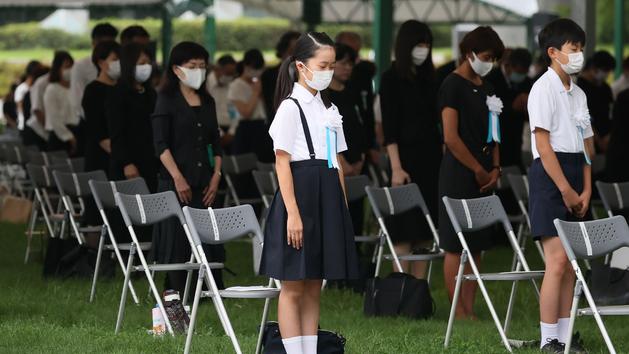Japan commemorated Thursday August 6 the first nuclear attack in history, which occurred 75 years ago on August 6, 1945 in Hiroshima, in the particular context of the coronavirus pandemic which forced to limit this year the tributes to the victims.
To read also: Setsuko Thurlow, survivor of Hiroshima: "My nightmare, it is the people who deny the nuclear threat"
Atomic bomb survivors, descendants of victims, Japanese Prime Minister Shinzo Abe and some foreign officials participated in the main remembrance ceremony in the early morning in Hiroshima (western Japan), most wearing masks. The general public, on the other hand, had not been invited to the event because of the Covid-19, and had to content themselves with following the ceremony online. Other events were completely canceled, including the Hiroshima Floating Lantern Ceremony, which was laid at nightfall on August 6 in memory of the victims.
A silent prayer was held at 8:15 am local time (Wednesday night to Thursday), marking the precise moment the atomic bomb exploded in the sky over Hiroshima 75 years ago.
" We must never allow this painful past to repeat itself, " city mayor Kazumi Matsui said in a speech, calling on civil society to reject the " inward-looking " of nationalisms. " I pledge to do my best for the advent of a world without nuclear weapons and lasting peace, " promised Shonzo Abe, often criticized for his intention to revise the pacifist Japanese constitution.
The " Little Boy " bomb killed around 140,000 people in Hiroshima. It exploded about 600 meters above the city, with a power close to 15,000 tons of TNT. Many victims were killed instantly, and many more also died from their injuries or from radiation in the weeks and months that followed. The temperature at the bomb's epicenter in Hiroshima is estimated at 7,000 degrees. A furnace that caused serious burns and many fatal within a radius of about 3 kilometers.
The city of Hiroshima in November 1945, three months after the explosion of the atomic bomb. HANDOUT / AFP
Three days later, a second American A-bomb was dropped on Nagasaki (southwest), causing an additional 74,000 deaths.
These two bombs of a destructive power unprecedented at the time brought Japan to its knees: on August 15, 1945, Emperor Hirohito announced to his subjects the surrender to the Allies, thus signing the end of World War II. .
Historians, however, continue to debate whether this double nuclear attack actually saved more lives by hastening the end of the conflict. Many consider the nuclear attacks on Hiroshima and Nagasaki to be war crimes, given the unprecedented scale of their devastation and the large number of civilian casualties.
The United States has never officially apologized. But in 2016, Barack Obama became the first sitting US president to visit Hiroshima, where he paid tribute to the victims and called for a world without nuclear weapons.

